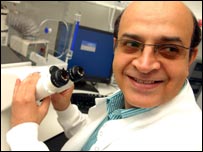

“For the first time we have created life using artificial sperm” - Professor Karim Nayernia. Image Credit: Kamir/BBC
This guy looks too happy ...
He should, I guess, he just proved that man can make sperm cells in a lab environment.
Through the isolation of embryonic stem cells, scientists in the lab, have created sperm cells, then implanted these cells into the females of the species of mice that were used in the experiment and created offspring.
So when do you think we begin to enter "the slippery slope", and who decides when we may have slipped a little too much?
This breakthrough offers a whole new spin on "Knockout Mouse Ranching" - Atrificial mouse brothels?
Excerpts from a report published in the journal 'Developmental Cell' via BBC Health -
'Lab-made sperm' fertility hope
By BBC - Last Updated: Sunday, 9 July 2006, 23:01 GMT 00:01 UK
Scientists have proved for the first time that sperm grown from embryonic stem cells can be used to produce offspring.
The discovery in mice could ultimately help couples affected by male fertility problems to conceive.
And by understanding embryo developmental processes better, a host of other diseases might be treated using stem cells, they say.
----
The experiment was carried out using mice and produced seven babies, six of which lived to adulthood.
However, the mice showed abnormal patterns of growth, and other problems, such as difficulty breathing.
As well as the safety concerns, using stem cells to create sperm also raises ethical questions.
For the first time we have created life using artificial sperm
Stem cells are special because they have the potential to develop into any tissue in the body.
----
They encouraged these early-stage sperm cells, known as spermatogonial stem cells, to grow into adult sperm cells and then injected some of these into female mouse eggs.
The fertilised eggs grew and were successfully transplanted into female mice and produced seven babies.
----
In the future, men with fertility problems might be able to have their own stem cells harvested using a simple testicular biopsy, matured in the lab and then transplanted back.
It is estimated that one in seven UK couples have difficulty conceiving - about 3.5 million people. In about a third of all couples having IVF, male fertility is a contributory factor.
It is more difficult to say whether artificial sperm produced this way could ultimately be used as a new treatment for male infertility.
----
Professor Harry Moore, professor of reproductive biology at the University of Sheffield, said: "These processes in the test-tube are far from perfect as the mice that were born by this process were abnormal.
"We therefore have to be very cautious about using such techniques in therapies to treat men or women who are infertile due to a lack of germ stem cells until all safety aspects are resolved. This may take many years."
Anna Smajdor, a researcher in medical ethics at Imperial College London, said: "The creation of viable sperm outside the body is a hugely significant breakthrough and offers great potential for stem cell research and fertility treatments.
"However, sperm and eggs play a unique role in our understanding of kinship and parenthood, and being able to create these cells in the laboratory will pose a serious conceptual challenge for our society."
Josephine Quintavalle, of Comment on Reproductive Ethics, agreed.
She said the use of adult stem cells from sources such as umbilical cord blood had consistently produced more promising results than the use of embryonic stem cells.
Read All>>


No comments:
Post a Comment